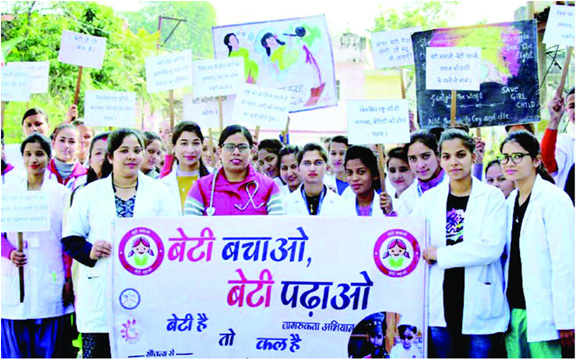
- Independence day special
As we celebrate 75th Independence Day, let us not forget that somewhere in interior India, women are still fighting for their freedom, liberty, and justice. That they are fighting for not just themselves but also their family and society is what makes them special. And this is why we must pay respect to the unconditional contribution women have made, from raising children to maintaining households; from working in the day to looking after their family in the evening.
Looking at various indicators that define women, such as economic and political empowerment, justice, safety, health and dignity, India has made a leap forward from where it began in 1947. In the last 70 years of Indian history, we have seen a degree of social progress across multiple issues that concern women in India. Indicators such as education, crime, gender equality and women empowerment, have witnessed a marked improvement.
Today, we have more girls enrolled in schools than what it was 75 years ago. As per Unified-District Information System For Education (UDISE), the Gross Enrolment Ratio (GER) of girls at the secondary level is 80.97% and at Senior Secondary level is 56.41% respectively. Health wise, the mortality rate has come down. The gender gap has narrowed and women are beginning to play leadership roles in politics and corporate sector.
In spite of the social progress made by women, however, challenges exist. Female labour force participation rate declined from 42.5% in 1987-1988 to 18% in 2011-2012 for rural women and from 25.4% in 1987-88 to 13.4% in 2011-2012 for urban women. At the same time, official data does not reflect the amount of work that women actually do to enable their families to survive, collecting fuel, fodder or water, keeping poultry, working as unpaid labor on family farms.
As our society confronts these challenges towards the greater emancipation of women in India, we list out five key schemes delivered by the government that is playing or have played an important role in delivering empowerment and socio-economic progress for women in India.
National Policy of Women
The policy unveiled by the Government last year will help towards the creation of a society with women working as equal partners in all spheres of life. It envisages developing a framework to ensure equal rights and opportunities for women.
Formation of Central and State Commission for Women
A key statutory and regulatory development, the formation of National Commission for Women and subsequently state commission from 1992 onwards has played a pivotal role to address women’s right issues in the highest Government capacity. Formed under the 1990 National Commission for Women’s Act, the Commission has represented the rights of women in India and to provide a voice for their issues and concerns. The subjects of their campaigns have included issues that concern the lives of women in India such as dowry, politics, religion, equal representation for women in jobs, and the exploitation of women for labor.
Sarva Shiksha Abhiyan
The Sarva Shikha Abhiyan, India’s first ever nation-wide program for Universal Elementary Education has gone a long way to deliver education for girls in India. The program, pioneered by former Prime Minister Atal Bihari Vajpayee, has helped educate millions of children across the country and helped raise literacy levels among women in India.
Direct Benefit Transfer
In India, subsidies are paid to rural households to help them access basic utilities. Leakages and delays, however, are a common phenomenon attached with subsidy transfer that leads to situations where the beneficiaries suffer without access to subsidies. To address this challenge, the Government launched the Direct Benefit Scheme that has now been championed by the present Government as a mechanism to address leakages and prevent delays by directly transferring the money into the account of beneficiaries. Women have benefited the most as they are the ones responsible for maintaining the household activities, and with the advent of this scheme, have been able to access funds and subsequently manage their expenses.
Beti Bachao Beti Padhao
The trend of declining sex ratio from 945 in 1991 to 918 in 2011 has been a major cause of concern. To address this challenge and to enhance girl child literacy, Prime Minister Modi launched the Beti Bachao Beti Padhao in 2015. Notwithstanding the challenges towards its implementation and delivery, the program has helped increase access to education as a means to empower the girl child.
75 years of Socio-Political Progress
75 years since independence, the Indian woman has surged ahead with great leaps and bounds. Today we have higher levels of consciousness about the plight of women in our country where women have suffered a lot of exploitation and discrimination.
The discourse on women empowerment and gender equality has gone beyond the chores of households into the political arena of policies and development. Violence is spoken about but also women have broken their silence against the crimes. The present generations of men are also more sensitive than their previous generations and this is a welcome trend towards enhancing gender sensitivity in the country.
The realization that women should be treated equally in our society has made considerable progress in light of the social and political challenges that confronted us at the time of independence. We have witnessed a sense of movement that is driving social progress and recognizing the role of women in politics, labor force etc. Over the years, we have seen suffering for women at every level at a workplace.
However, we believe that positive times are here to come and stay to eliminate the suffering of women and enhance their equality in the society. We feel a sense of satisfaction having been able to help women from getting laws amended to raising social issues in public, helping women access to justice and joining forces with institutions to drive women empowerment.
The next 75 years
For the coming 75 years, there is a sense of optimism. Although there is no short cut to embrace equality and gender justice, there is no alternative either. In the future we will have more women in policy making and in Parliament. It is believed that women will play a critical role towards delivering peace and harmony in the world, and through that, We see much more economic justice and equality. We believe this because women care, nurture and rear and they feel pain greater than men.
This is why, we also believe that global women leadership can bring an end to conflicts and war. As women are more sensitive to crisis and wars, We are hopeful that in the coming years, women leadership can deliver tranquility and help humanity evolve from the dark times of conflicts that have engulfed our societies from time to time.





Be the first to comment